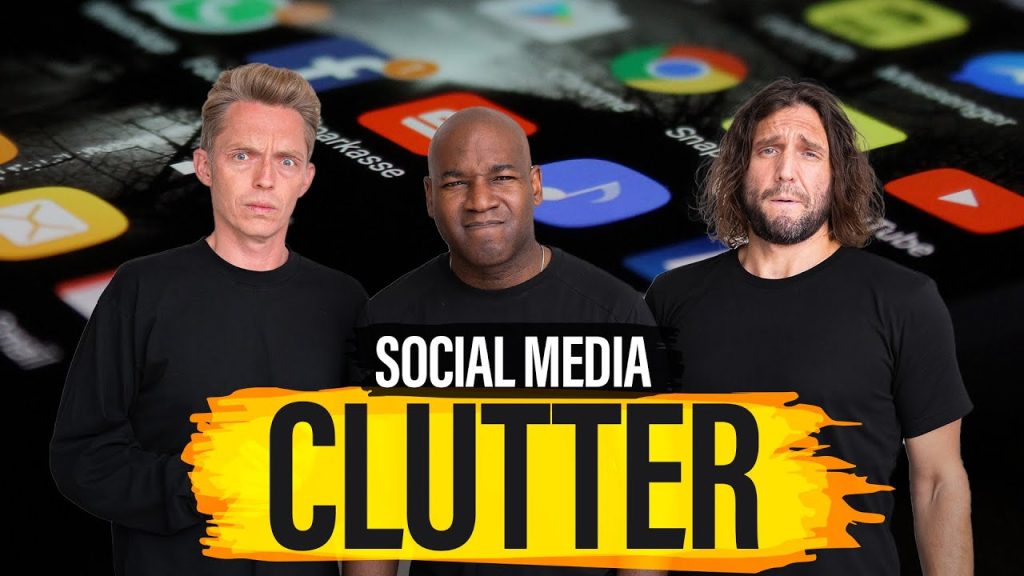
Maintaining a healthy relationship with social media is the focus of this episode. The hosts discuss the frustrations of social media clutter and its lack of value in both personal and business aspects. They delve into the idea of not heavily relying on social media for business success and provide examples of companies that have found success without it. The importance of adding value to social media rather than contributing to the noise is emphasized. The episode also covers the top social media sites for businesses to consider in 2023, highlighting the importance of selecting platforms that align with the target audience and business goals. Alternative methods for growing a business without relying solely on social media, such as networking, collaboration, and starting a newsletter, are suggested.
Table of Contents
Understanding the Relationship with Social Media
Awareness of Social Media’s Impact
When it comes to social media, it’s essential to be aware of its impact on both personal and business aspects of life. Social media has become a significant part of our daily routines, with many people spending hours scrolling through various platforms every day. However, it’s crucial to recognize that this constant exposure to social media can have both positive and negative effects on our mental well-being and productivity.
On a personal level, social media can be a valuable tool for staying connected with friends and family, discovering new hobbies and interests, and finding inspiration. It allows us to share our thoughts, experiences, and accomplishments with others, fostering a sense of belonging and validation. However, excessive use of social media can lead to feelings of comparison, inadequacy, and anxiety. The curated nature of social media posts can create unrealistic expectations and contribute to the “highlight reel” phenomenon, where people only showcase their best moments, hiding the challenges and struggles they face in reality.
Similarly, from a business perspective, social media can be a powerful platform for marketing, networking, and building a brand image. It provides a cost-effective way to reach a wide audience, engage with customers, and promote products or services. However, the constant pressure to create content, gain followers, and compete with other businesses can be overwhelming and time-consuming. Moreover, the constant algorithm changes and evolving trends make it challenging to maintain consistent visibility and engagement on social media platforms.
Recognizing the Frustration with Social Media Clutter
One of the common frustrations with social media is the clutter it creates in our lives. With the abundance of content available, it’s easy to feel overwhelmed and lose focus. The constant stream of notifications, ads, and irrelevant posts can distract us from our priorities and hinder our productivity. It can feel like we’re constantly bombarded with information that may not necessarily add any value to our lives or align with our interests and goals.
Additionally, social media clutter can also contribute to a sense of disconnection and isolation. While it provides a platform for communication and connection, the superficial nature of online interactions can often leave us craving genuine human connection. The emphasis on likes, comments, and shares can turn social media into a popularity contest, where meaningful connections and conversations are often sidelined.
Exploring the Lack of Value in Social Media
Another aspect to consider when assessing our relationship with social media is the question of value. Many individuals and businesses find themselves investing significant time and effort into social media without seeing tangible benefits or return on investment. This raises the question of whether social media is truly necessary for personal or business growth and whether the time and energy spent on it could be better utilized elsewhere.
For personal users, it’s important to evaluate whether social media adds genuine value to their lives. While it can be entertaining and informative, it’s crucial to assess whether the benefits outweigh the drawbacks. Are you finding meaningful connections and content that enrich your life, or is it mostly mindless scrolling and comparison? Reflecting on these questions can help determine whether social media is worth your time and attention.
Similarly, for businesses, it’s essential to analyze the effectiveness of social media as a marketing tool. While it may seem like a necessity in today’s digital age, not all businesses necessarily need a heavy reliance on social media. Some companies have achieved success by focusing on other marketing strategies or by targeting niche audiences that may not be highly active on social media platforms. By examining successful companies without a significant social media presence, businesses can gain insights into alternative growth strategies and potential opportunities.
Examining Successful Companies without Heavy Reliance on Social Media
While social media has become synonymous with business success in today’s digital landscape, it’s important to recognize that not all successful companies heavily rely on social media for growth. Some businesses have thrived by focusing on other marketing channels or by leveraging their unique selling points to attract and retain customers.
For example, Apple, one of the most successful companies globally, has a minimal presence on social media platforms. With zero posts on Twitter and Facebook, Apple focuses on other forms of marketing, such as product launches, advertising campaigns, and collaborations. By prioritizing quality products and customer experience, Apple has built a strong brand reputation without depending on social media to promote their products and services.
This example highlights the importance of understanding the specific needs and preferences of your target audience. By identifying alternative marketing channels and strategies that align with your customers’ preferences, businesses can create a meaningful impact without solely relying on social media.
Assessing the Value of Social Media
Considering Opting Out of Social Media
After recognizing the impact and frustrations associated with social media, one might consider the option of opting out entirely. For some individuals and businesses, social media may not align with their values, goals, or preferred modes of communication. Opting out of social media means consciously choosing to disconnect from platforms and find alternative ways to connect, communicate, and engage with others.
While it may seem daunting to disconnect from social media entirely, it can provide a sense of liberation and freedom from the constant noise and distractions. It allows for more intentional and mindful use of time and attention, focusing on activities and relationships that truly matter. However, it’s essential to weigh the potential benefits and drawbacks of this decision, as it may vary based on individual circumstances and objectives.
Determining the Personal and Business Goals
Before making a decision about social media usage, it’s crucial to determine your personal and business goals. Understanding what you want to achieve and how social media aligns with those goals can help guide your choices and actions.
On a personal level, ask yourself what you seek from social media. Are you using it for entertainment, staying connected with family and friends, or exploring new interests? Assess whether social media contributes to your overall well-being and if it aligns with your values and priorities.
For businesses, clearly defining your goals is crucial in assessing the value of social media. Consider whether social media platforms are effective in reaching your target audience, promoting your products or services, and achieving your desired business outcomes. Analyze whether the time, effort, and resources invested in social media generate measurable returns and contribute to the growth and success of your business.
Weighing Value versus Distractions
One of the key aspects to consider when assessing the value of social media is the balance between its benefits and the distractions it creates. While social media may provide opportunities for connection, learning, and business growth, it also has the potential to divert our attention and hinder productivity.
Take a moment to reflect on your experiences with social media. Does it add value to your life or business, or does it primarily serve as a source of distraction? Are you using social media intentionally and mindfully, or do you find yourself mindlessly scrolling and getting caught in a cycle of comparison, envy, or negativity?
Weighing the value of social media against its distractions requires conscious awareness and self-reflection. By setting boundaries, limiting usage, and staying focused on your goals, you can reap the benefits of social media while minimizing its potential drawbacks.
Striving to Add Value Instead of Noise
Whether you decide to use social media or opt out entirely, one principle remains essential: strive to add value instead of contributing to the noise. In a saturated digital landscape, where everyone is vying for attention, it’s crucial to create content and engage with others in a way that genuinely resonates and provides meaning.
If you choose to use social media, consider how you can make a positive impact through your posts, comments, and interactions. Focus on creating valuable and authentic content that educates, inspires, and entertains your audience. Engage with others genuinely, fostering real connections and conversations. By adding value to people’s lives, you can cut through the noise and create a meaningful presence on social media.
Alternatively, if you decide to opt out of social media, strive to bring value to your offline interactions and relationships. Embrace in-person conversations, networking events, and other forms of direct engagement. By focusing on quality connections and experiences, you can build meaningful relationships and grow your personal and professional networks beyond the digital realm.

This image is property of i.ytimg.com.
Identifying Social Media Platforms for Businesses
Overview of the Top Social Media Sites in 2023
As of 2023, several top social media sites continue to dominate the digital landscape. Understanding these platforms can help businesses determine which ones align with their target audience and marketing objectives.
The top social media platforms in 2023 include:
-
Facebook: With over 2.8 billion monthly active users, Facebook remains a prominent platform for businesses to connect with a wide range of audiences. It offers various advertising options and features that allow businesses to showcase their products or services effectively.
-
Instagram: Known for its visual content, Instagram has over 1 billion monthly active users. It provides businesses with an opportunity to showcase visually appealing content, engage with followers through stories and posts, and leverage influencers to expand their reach.
-
YouTube: As the largest video-sharing platform, YouTube boasts over 2 billion logged-in monthly active users. It offers businesses a space to create and share video content, reach a global audience, and monetize their channels through ads and partnerships.
-
LinkedIn: Designed for professional networking, LinkedIn has over 774 million members worldwide. It serves as a platform for businesses to connect with industry professionals, showcase their expertise, and generate leads through targeted marketing campaigns.
-
Twitter: With 330 million monthly active users, Twitter enables businesses to engage in real-time conversations, share news and updates, and build brand recognition through concise and impactful tweets.
These platforms have established user bases and offer a range of features and tools for businesses to leverage. However, it’s crucial to conduct market research and analyze your target audience to identify which platforms are most likely to connect with them effectively.
Exploring Lesser Known Platforms
In addition to the well-known social media platforms, there are also several lesser-known platforms that may offer unique opportunities for businesses to connect with their target audience. These platforms cater to specific niches, interests, or demographics, making them valuable for businesses seeking a more targeted approach.
Platforms like WeChat, QQ, Telegram, Q Zone, Discord, Twitch, Tumblr, Mastodon, and OnlyFans have gained popularity among specific communities or user groups. These platforms may provide businesses with the chance to tap into niche markets, engage with highly dedicated audiences, or explore unconventional marketing strategies.
However, it’s important to thoroughly research and understand the dynamics and audience of these lesser-known platforms before investing time and resources into them. Each platform has its own set of rules, norms, and user behaviors, and businesses must align their marketing efforts accordingly to establish a successful presence.
Platforms for Business Consideration
While the choice of social media platforms may vary depending on specific business goals and target audiences, some platforms are particularly well-suited for certain business needs. Consider the following platforms based on their inherent strengths and advantages:
-
Facebook: Best for businesses targeting a wide range of demographics and seeking to build a comprehensive online presence through various features like pages, groups, and ads.
-
Instagram: Ideal for businesses with visually appealing products or services, targeting a younger demographic, and looking to leverage influencer marketing.
-
LinkedIn: Suited for B2B businesses, professional services, and networking-focused industries, providing opportunities for lead generation and establishing industry authority.
-
YouTube: Well-suited for businesses that can create engaging video content or tutorials, aiming to reach a global audience and monetize their channel.
-
Twitter: Beneficial for businesses focusing on real-time communication, updates, and fostering engagement through concise messaging and trending conversations.
It’s important to remember that each platform requires a unique approach and content strategy to maximize its potential. By understanding the strengths and characteristics of each platform, businesses can craft tailored marketing strategies that resonate with their target audience and contribute to their overall objectives.
Connecting with the Target Audience through Social Media
The key to success on social media lies in effectively connecting with the target audience. Regardless of the chosen platforms, businesses must understand their audience’s preferences, interests, and behaviors to create a meaningful connection and establish a loyal following.
Start by defining your target audience in terms of demographics, interests, and motivations. Conduct market research, gather customer feedback, and analyze social media insights to gain insights into their online behavior and preferences. Use this information to tailor your content, messaging, and engagement strategies to align with their needs and desires.
Engage with your audience by responding to comments, messages, and inquiries promptly. Show genuine interest in their opinions and feedback. Don’t just focus on selling or promoting your business; instead, aim to provide value, entertainment, education, or inspiration through your social media presence.
Consistency is also crucial in maintaining a connection with your audience. Regularly post engaging content, share updates, and participate in relevant conversations. By consistently showing up on social media, you build credibility and trust with your audience, leading to stronger relationships and increased brand loyalty.
Different Perspectives on Social Media Usage
Choosing to Be Active on Social Media
One perspective on social media usage is choosing to be active and fully engaged with various platforms. This approach sees social media as a valuable tool for communication, connection, and growth. Individuals and businesses who choose to be active on social media believe in leveraging its potential to reach a wider audience, build relationships, and promote their passion or business.
For personal users, actively engaging with social media may involve sharing updates, exploring new interests, connecting with like-minded individuals, and finding inspiration. It can be a way to stay connected with friends and family, learn about current events, or contribute to online communities.
From a business perspective, being active on social media entails regular posting, engaging with followers, responding to comments and messages, and leveraging social media analytics to make informed decisions. It involves crafting a consistent brand identity, sharing valuable content, and fostering an online community to build trust and loyalty with customers.
Considering Opting Out Completely
On the other end of the spectrum, some individuals and businesses consider opting out of social media completely. This perspective views social media as a source of distraction, negativity, and superficial connections. Those who choose to opt out believe that disconnecting from social media allows for a more authentic and focused way of living and working.
For personal users, opting out may involve deleting social media accounts, limiting screen time, and seeking alternative ways to connect with others and pursue personal hobbies or interests. It allows for a more present and mindful experience, reducing the pressure to constantly compare oneself to others and seek validation through likes and comments.
From a business standpoint, opting out of social media means focusing on other marketing strategies that align more closely with the target audience and business goals. Companies opting out can leverage other channels such as email marketing, influencer partnerships, or industry-specific platforms to reach their customers and expand their reach.
Finding a Balance with Social Media
A middle-ground perspective on social media usage is finding a balance that works for individuals and businesses. This approach acknowledges the potential benefits of social media while also recognizing the need for boundaries, self-care, and real-world connections.
Finding a balance involves using social media intentionally and mindfully, setting limits on usage, and prioritizing offline experiences and relationships. It requires self-awareness and the ability to step back when social media starts to feel overwhelming or negatively impact well-being. By finding a balance, individuals can enjoy the benefits of social media while minimizing the drawbacks.
For businesses, finding a balance may mean focusing on a select few platforms that align with their target audience and goals. It involves strategic posting, outsourcing social media management, and setting boundaries on time and resources allocated to social media activities. By finding the right balance, businesses can leverage social media effectively without compromising other aspects of their operations or well-being.
Examining the Pros and Cons of Each Perspective
Each perspective on social media usage comes with its own set of pros and cons, and the right approach may vary depending on individual circumstances and objectives.
Actively engaging with social media allows individuals and businesses to tap into its vast potential, including wider reach, networking opportunities, and brand promotion. It can lead to increased visibility, potential collaborations, and access to valuable resources and information. However, it requires time, effort, and consistent content creation to maintain a meaningful presence. The pressure to constantly stay active on social media may also contribute to stress and distraction.
Opting out of social media completely provides individuals and businesses with a sense of liberation and freedom from the noise, comparison, and superficial connections often associated with social media. It allows for a more focused and intentional way of living and working. However, it may result in missing out on valuable connections, news, and opportunities that social media can provide. For businesses, opting out may limit their reach and potential customer base, requiring alternative marketing strategies to compensate.
Finding a balance with social media allows individuals and businesses to enjoy the benefits of connection, information sharing, and promotion while maintaining boundaries and prioritizing offline experiences. It provides the flexibility to tailor social media usage to personal and business needs, ensuring that it adds value without becoming a source of overwhelm or distraction. However, finding a balance requires self-discipline, self-awareness, and regular evaluation of social media’s impact on well-being and productivity.

Growing a Business Beyond Social Media
Exploring Alternative Methods for Growth
Growing a business beyond social media involves exploring alternative methods and strategies that align with specific goals and target audiences. While social media can be a valuable tool for business growth, it’s not the only approach to consider, and depending solely on social media may overlook potential opportunities in other areas.
One alternative method for growth is focusing on offline marketing strategies. This may include traditional advertising, local events and partnerships, print media, or direct mail campaigns. Offline methods often provide a more targeted and personal approach, allowing businesses to connect with their local community or target audience in a meaningful way.
Another alternative method is leveraging networking and collaboration opportunities. Building genuine relationships with industry peers, influencers, or complementary businesses can open doors to new customer bases, partnerships, and knowledge sharing. By attending industry events, participating in networking groups, or collaborating on projects, businesses can access a wider network and potential customer referrals.
Networking and Collaborating with Others
Networking and collaboration play a vital role in business growth and can be particularly effective in expanding beyond the limitations of social media. By actively seeking out networking opportunities and building connections, businesses can tap into new markets, gain valuable insights, and establish mutually beneficial relationships.
Attending industry conferences, trade shows, or local meetups allows businesses to connect with like-minded professionals, potential partners, or customers. These events often offer opportunities to showcase products or services, deliver presentations, and engage in face-to-face conversations that can lead to business growth.
Collaborating with influencers, thought leaders, or complementary businesses can also contribute to business expansion. By partnering with those who share a similar target audience or vision, businesses can leverage existing networks and tap into new customer bases. Collaborations can take the form of joint marketing campaigns, co-creation of content, or cross-promotion, allowing businesses to reach a wider audience and build credibility.
Starting a Newsletter for Direct Engagement
An effective way to grow a business beyond social media is by starting a newsletter for direct engagement with customers and potential leads. Newsletters provide a more personal and targeted way to deliver valuable content, updates, and promotions directly to subscribers’ inboxes.
By offering exclusive content, insights, or discounts through a newsletter, businesses can incentivize audience members to subscribe and maintain a direct line of communication. Newsletters allow businesses to establish themselves as industry experts, drive website traffic, and nurture leads through targeted email marketing campaigns.
When starting a newsletter, focus on creating content that adds value and resonates with your target audience. Keep the newsletters visually appealing, concise, and relevant to maintain readers’ interest. Provide opportunities for subscribers to engage, such as through surveys, feedback forms, or exclusive offers.
Utilizing Offline Strategies for Business Expansion
In addition to networking and newsletters, offline strategies can contribute significantly to business expansion. By embracing offline methods, businesses can tap into a more targeted and personal approach, connecting with customers on a deeper level.
Traditional advertising, such as television, radio, or print media, allows businesses to reach a broad audience and build brand awareness. While social media provides an effective platform for reaching a large audience, offline advertising can help capture the attention of those who may not be active on social media or prefer traditional media channels.
Participating in local events or hosting workshops and seminars enables businesses to showcase their expertise, engage with potential customers face-to-face, and build trust within the community. These events provide opportunities for direct interaction, networking, and demonstrating the unique value a business offers.
Direct mail campaigns, although less common in the digital age, can still be effective in reaching potential customers. By targeting specific geographical areas or demographics, businesses can deliver personalized messages, coupons, or promotional materials directly to mailboxes, capturing attention in a tangible and memorable way.
Conclusion
In conclusion, maintaining a healthy relationship with social media requires awareness, reflection, and intentional action. Understanding the impact of social media on personal and business aspects of life is crucial in evaluating its value and determining the best approach moving forward.
By recognizing the frustrations and clutter associated with social media, individuals and businesses can make informed choices about its role in their lives. Whether choosing to be active, opting out, or finding a balance, it’s essential to prioritize value and meaningful connections over superficial noise.
For businesses, identifying the social media platforms that align with their target audience and goals is key. While well-known platforms like Facebook, Instagram, and LinkedIn remain popular, exploring lesser-known platforms or alternative growth strategies can lead to untapped opportunities for expansion.
Ultimately, maintaining a healthy relationship with social media involves a continuous evaluation of its impact and alignment with personal or business objectives. By striving to add value instead of noise, connecting with the target audience, and exploring alternative methods for growth, individuals and businesses can navigate the complex social media landscape with intention, authenticity, and success.


